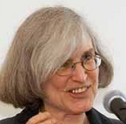Heroes of the Road: Jewish Peddlers and the Great Migration
Hasia Diner

Abstract
In the era from the end of the eighteenth century through the 1920s about four million Jews — one-third of world Jewry — left their homes in central and eastern Europe, as well as the Ottoman Empire and went out to the entire “new world,” with the United States as the most desired and desirable destination. Among them millions of the men picked up peddlers’ packs, and took their first steps in their destination places on the road, going house to house, farm to farm, to mining and logging camps, to mill towns bringing consumer goods to people with little access to the market. Yiddish speakers predominated among these on-the-road peddlers, and these often very ordinary individuals helped foster the transfer of the Jewish population from old homes to new. They shaped Jewish integration into these lands as well, creating a new chapter in modern Jewish history.
Biography
Hasia Diner is a Professor of Hebrew and Judaic Studies and History at the New York University Skirball Department of Hebrew and Judaic Studies.
Hasia Diner's work has been located at the intersection of American and Jewish history. Her first book explored the ways in which American Jewish engaged with the issues surrounding the condition of black Americans in the early twentieth century. Her most recently published book examined the ways in which Jews in post-World War II America went about the process of creating a public culture that memorialized the Holocaust. Throughout, she has been interested on the mutual impact of America and the Jews. She has ventured out from there looking in several books at the histories of other European immigrant groups in the United States. She is currently completing a book on global Jewish migrations and the history of Jewish peddling, a project that takes her far afield from the United States.
